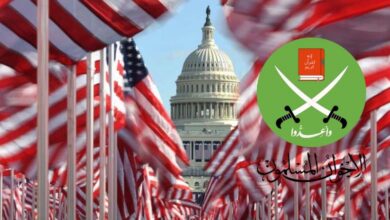Washington warns its allies in the region against violating sanctions on the Al-Assad regime

The White House announced that the United States will not normalize its relations with the regime of Bashar Al-Assad in Syria, warning the allies in the region from the repercussions of breaking sanctions on Damascus and clarifying that sanctions will remain in full force. This is in an obvious response to White House spokesperson Karen Jean-Pierre, who asked journalists on Monday about the decision of returning Syria to the Arab League.
The United States has stood firm in its stance towards Damascus, particularly in its refusal to break the regime’s isolation in the Arab world, because Washington regards this as a victory for Iran and Russia, its allies.
The Syrian crisis and the decision by Arab and Gulf states, led by Saudi Arabia, to resume ties with Damascus are at the center of a dispute between Washington and its regional allies, with the administration of US President Joe Biden rejecting the idea of the Russian-backed regime regaining its regional and international relations.
“Baer said Washington is skeptical of the al-Assad regime’s willingness to take steps to resolve the crisis in its country, and is aligned with its partners on ultimate goals as Washington continues to believe the regime’s survival poses a risk in the region.”
“Washington still sees itself as sharing a goal of moving beyond the al-Assad era, although developments on the ground suggest otherwise and the regime has regained the initiative against the opposition, including the Western-backed Kurdish People’s Protection Units (YPG).”
Last week, Iranian President Ebrahim Raisi said from Syria that developments in the region, notably the resumption of ties with Riyadh and efforts to restore ties with Syria, would weaken US influence.
“We make clear to our partners that we will not normalize relations with the al-Assad regime and that our sanctions will remain in full force,” said Jean-Pierre.
In an tone that does not lack warning, she pointed out that Washington informed its partners who conduct meetings with the regime that it is committed to the Caesar Penal Code, and warned them not to risk facing sanctions.
“Washington’s threat of sanctions against anyone seeking to break Damascus’ isolation would have many repercussions, especially as Washington has recently sought to resolve differences with its Gulf allies, particularly Riyadh, far from escalation in an effort to limit Chinese and Russian influence.”
“On Sunday, Arab foreign ministers decided to resume the participation of delegations from the Syrian regime in the meetings of the Arab League Council and all affiliated organizations and bodies as of May 7, in a move considered by some as a victory for the al-Assad regime.”
Qatar rejected the resolution, saying it “will not normalize relations with the government of Damascus despite the decision of the Arab foreign ministers,” a position consistent with Washington’s view.
“Syria’s participation in the Arab League meetings and organizations was suspended on 16 November 2011, following a decision by the Arab League Council at the ministerial level following an emergency meeting, against the backdrop of the Syrian regime’s crackdown on popular protests calling for change.”
In 2020, the U.S. passed the Syria Civilian Protection Act, known as the Caesar Act, which imposes sanctions on the Syrian regime and any countries that cooperate with it in most sectors, including energy.












